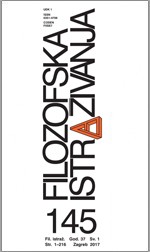Pitanje o smislu rata kao otuđeno pitanje ili pitanje otuđenja? Između neorealizma Kennetha Waltza, kritike Noama Chomskog i poetike Hermanna Hessea
Is the Question about the Meaning of War an Alienated Question or is it the Question of Alienation? Between the Neorealism of Kenneth Waltz, the Critique of Noam Chomsky and the Poetics of Hermann Hesse
Author(s): Nenad VertovšekSubject(s): Ethics / Practical Philosophy, Political Philosophy, Social Philosophy, History and theory of political science
Published by: Hrvatsko Filozofsko Društvo
Keywords: world wars; political philosophy; alienation; dehumanization; violence; Kenneth Waltz; Noam Chomsky; Hermann Hesse;
Summary/Abstract: World War I was the (un)expected situation of frightening intensity that has greatly changed the prior concepts and discussions about the limitations of war operations. It was somewhat “enchanting” for technologists, exciting for the politicians, and shocking for the intellectuals. International relations (through the League of Nations and United Nations) after World War II changed, with silent wars being led by idealists and realists of the theory of politics and international relations. As a neorealist, Kenneth Waltz directs discussion about the meaning of war less towards the matter of human nature, and more towards the questions regarding countries, international systems, and global structure that create the need for a war or the need for establishing peace. He recognizes that modern methods of (philosophy of) politics and political science should still be pervaded with classical approaches, and criteria of philosophical and political thought. In the debate about the nature of war or about the necessity of peace, the concepts of force and the state domination should be exposed. They are carried out in the cultural, technological, and even in the mass media sphere, and here Noam Chomsky’s critical approach is needed. Attitude of the public, the reaction of intellectuals, and the atmosphere which was caused by the First World War has to be (re)affirmed in order to – and through the essays by Hermann Hesse – better face with today’s postmodern dehumanization, and the pointlessness of current concepts and perspectives of War.
Journal: Filozofska istraživanja
- Issue Year: 37/2017
- Issue No: 01/145
- Page Range: 83-102
- Page Count: 20
- Language: Croatian

